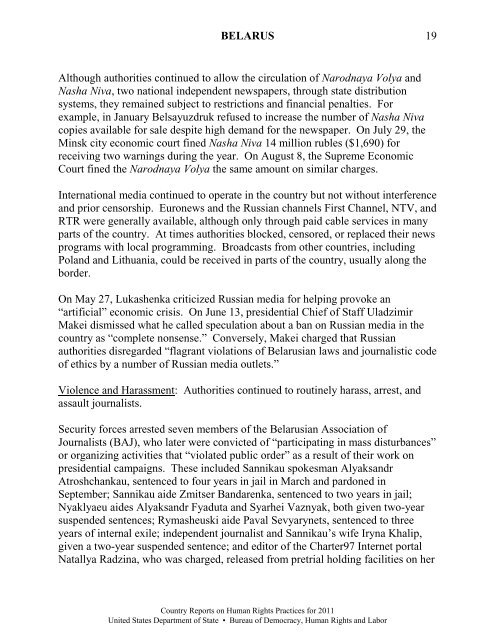belarus executive summary - US Department of State
belarus executive summary - US Department of State
belarus executive summary - US Department of State
You also want an ePaper? Increase the reach of your titles
YUMPU automatically turns print PDFs into web optimized ePapers that Google loves.
BELAR<strong>US</strong> 19<br />
Although authorities continued to allow the circulation <strong>of</strong> Narodnaya Volya and<br />
Nasha Niva, two national independent newspapers, through state distribution<br />
systems, they remained subject to restrictions and financial penalties. For<br />
example, in January Belsayuzdruk refused to increase the number <strong>of</strong> Nasha Niva<br />
copies available for sale despite high demand for the newspaper. On July 29, the<br />
Minsk city economic court fined Nasha Niva 14 million rubles ($1,690) for<br />
receiving two warnings during the year. On August 8, the Supreme Economic<br />
Court fined the Narodnaya Volya the same amount on similar charges.<br />
International media continued to operate in the country but not without interference<br />
and prior censorship. Euronews and the Russian channels First Channel, NTV, and<br />
RTR were generally available, although only through paid cable services in many<br />
parts <strong>of</strong> the country. At times authorities blocked, censored, or replaced their news<br />
programs with local programming. Broadcasts from other countries, including<br />
Poland and Lithuania, could be received in parts <strong>of</strong> the country, usually along the<br />
border.<br />
On May 27, Lukashenka criticized Russian media for helping provoke an<br />
“artificial” economic crisis. On June 13, presidential Chief <strong>of</strong> Staff Uladzimir<br />
Makei dismissed what he called speculation about a ban on Russian media in the<br />
country as “complete nonsense.” Conversely, Makei charged that Russian<br />
authorities disregarded “flagrant violations <strong>of</strong> Belarusian laws and journalistic code<br />
<strong>of</strong> ethics by a number <strong>of</strong> Russian media outlets.”<br />
Violence and Harassment: Authorities continued to routinely harass, arrest, and<br />
assault journalists.<br />
Security forces arrested seven members <strong>of</strong> the Belarusian Association <strong>of</strong><br />
Journalists (BAJ), who later were convicted <strong>of</strong> “participating in mass disturbances”<br />
or organizing activities that “violated public order” as a result <strong>of</strong> their work on<br />
presidential campaigns. These included Sannikau spokesman Alyaksandr<br />
Atroshchankau, sentenced to four years in jail in March and pardoned in<br />
September; Sannikau aide Zmitser Bandarenka, sentenced to two years in jail;<br />
Nyaklyaeu aides Alyaksandr Fyaduta and Syarhei Vaznyak, both given two-year<br />
suspended sentences; Rymasheuski aide Paval Sevyarynets, sentenced to three<br />
years <strong>of</strong> internal exile; independent journalist and Sannikau’s wife Iryna Khalip,<br />
given a two-year suspended sentence; and editor <strong>of</strong> the Charter97 Internet portal<br />
Natallya Radzina, who was charged, released from pretrial holding facilities on her<br />
Country Reports on Human Rights Practices for 2011<br />
United <strong>State</strong>s <strong>Department</strong> <strong>of</strong> <strong>State</strong> • Bureau <strong>of</strong> Democracy, Human Rights and Labor
















